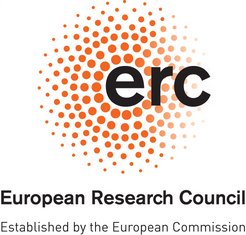The magnificent seven
Max Planck scientists win nearly three million euros each for their research projects
Seven scientists from Max Planck institutes, including one of our female colleagues, have successfully applied for Consolidator Grants from the European Research Council. They have each been awarded up to 2.75 million euros in funding for the research projects they submitted.

2014 marks the second year that Consolidator Grants have been awarded. They are intended for scientists seven to twelve years on from their PhD, who are heading a research group and have already been able to point to promising research findings. The ERC received 2,528 applications, of which 372 were approved. That is about a 14.7 percent success rate. Of the 327 funding recipients, 28 percent are women.
The largest number of scientists to receive one of these grants for up to five years will be working in the UK (86), followed by host organisations in Germany (66), France (53) and Spain (32). This does not necessarily match the nationalities of the scientists: Germans top the statistics with 69 grant recipients, followed by scientists of French (44), British (37), Spanish (33) and Italian (29) nationality.
Max Planck scientists submitted a total of 27 applications. The success rate is therefore above average, at 26 percent. Nevertheless, Rüdiger Hesse, head of the Brussels office of the Max Planck Society, is hopeful of a further increase in participation in future, pointing out that the number of applications submitted for the first round of the Starting Grants for junior scientists – those who only completed their PhD between two and seven years ago – was more than twice as high. Admittedly, the MPG does have more scientists of that seniority. Submitting an application is a very simple process and can be summed up in the following words: one scientist, one research institution, one project, one selection criterion: excellence.
Four of the seven grants awarded to the MPG are going into the life sciences, two into physics and technology and one into the social sciences and humanities. The outstanding scientists are:
- Henrik Beuther (MPI for Astronomy)
- Birte Höcker (MPI for Developmental Biology)
- Jan Huisken, Jochen Rink (MPI of Molecular Cell Biology and Genetics)
- Jonas Obleser (MPI for Human Cognitive and Brain Sciences)
- Mikael Simons (MPI of Experimental Medicine)
- Sönke Zaehle (MPI for Biogeochemistry)
The most Consolidator Grants in Europe went to scientists from the French Centre national de la recherche scientifique (CNRS), which received 25 of the grants in all. This number is not least so much higher than the figures from other research institutions because many scientists from French universities normally also submit their ERC applications through CNRS. The University of Cambridge won 12 grants, University College London got 9 and the Helmholtz Society came away with 8 grants.
RH/SB












